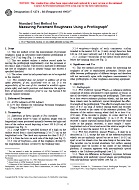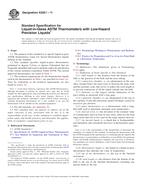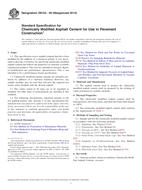1.1 PurposeThe purpose of this practice is to define good commercial and customary practice in the United States of America for conducting an environmental site assessment of a parcel of commercial real estate with respect to the range of contaminants within the scope of Comprehensive Environmental Response, Compensation and Liability Act (CERCLA) (42 U.S.C. 9601) and petroleum products. As such, this practice is intended to permit a user to satisfy one of the requirements to qualify for the innocent landowner, contiguous property owner, or bona fide prospective purchaser limitations on CERCLA liability (hereinafter, the “landowner liability protections,” or “LLPs”): that is, the practice that constitutes “all appropriate inquiry into the previous ownership and uses of the property consistent with good commercial or customary practice” as defined at 42 U.S.C. 9601(35)(B). (See for an outline of CERCLA’s liability and defense provisions.) Controlled substances are not included within the scope of this standard. Persons conducting an environmental site assessment as part of an EPA Brownfields Assessment and Characterization Grant awarded under CERCLA 42 U.S.C. 9604(k)(2)(B) must include controlled substances as defined in the Controlled Substances Act (21 U.S.C. 802) within the scope of the assessment investigations to the extent directed in the terms and conditions of the specific grant or cooperative agreement. Additionally, an evaluation of business environmental risk associated with a parcel of commercial real estate may necessitate investigation beyond that identified in this practice (see Sections 1.3 and 13).
1.1.1 Recognized Environmental ConditionsIn defining a standard of good commercial and customary practice for conducting an environmental site assessment of a parcel of property, the goal of the processes established by this practice is to identify recognized environmental conditions. The term recognized environmental conditions means the presence or likely presence of any hazardous substances or petroleum products on a property under conditions that indicate an existing release, a past release, or a material threat of a release of any hazardous substances or petroleum products into structures on the property or into the ground, ground water, or surface water of the property. The term includes hazardous substances or petroleum products even under conditions in compliance with laws. The term is not intended to include de minimis conditions that generally do not present a threat to human health or the environment and that generally would not be the subject of an enforcement action if brought to the attention of appropriate governmental agencies. Conditions determined to be de minimis are not recognized environmental conditions.
1.1.2 Petroleum ProductsPetroleum products are included within the scope of this practice because they are of concern with respect to many parcels of commercial real estate and current custom and usage is to include an inquiry into the presence of petroleum products when doing an environmental site assessment of commercial real estate. Inclusion of petroleum products within the scope of this practice is not based upon the applicability, if any, of CERCLA to petroleum products. (See X1.7 for discussion of petroleum exclusion to CERCLA liability.)
1.1.3 CERCLA Requirements Other Than Appropriate InquiryThis practice does not address whether requirements in addition to all appropriate inquiry have been met in order to qualify for the LLPs (for example, the duties specified in 42 U.S.C. 9607(b)(3)(a) and (b) and cited in Appendix X1, including the continuing obligation not to impede the integrity and effectiveness of activity and use limitations (AULs), or the duty to take reasonable steps to prevent releases, or the duty to comply with legally required release reporting obligations).
1.1.4 Other Federal, State, and Local Environmental LawsThis practice does not address requirements of any state or local laws or of any federal laws other than the all appropriate inquiry provisions of the LLPs. Users are cautioned that federal, state, and local laws may impose environmental assessment obligations that are beyond the scope of this practice. Users should also be aware that there are likely to be other legal obligations with regard to hazardous substances or petroleum products discovered on the property that are not addressed in this practice and that may pose risks of civil and/or criminal sanctions for non-compliance.
1.1.5 Documentation The scope of this practice includes research and reporting requirements that support the user’s ability to qualify for the LLPs. As such, sufficient documentation of all sources, records, and resources utilized in conducting the inquiry required by this practice must be provided in the written report (refer to 8.1.8 and 12.2).
1.2 ObjectivesObjectives guiding the development of this practice are (1) to synthesize and put in writing good commercial and customary practice for environmental site assessments for commercial real estate, (2) to facilitate high quality, standardized environmental site assessments, (3) to ensure that the standard of all appropriate inquiry is practical and reasonable, and (4) to clarify an industry standard for all appropriate inquiry in an effort to guide legal interpretation of the LLPs.
1.3 Considerations Beyond ScopeThe use of this practice is strictly limited to the scope set forth in this section. Section of this practice identifies, for informational purposes, certain environmental conditions (not an all-inclusive list) that may exist on a property that are beyond the scope of this practice but may warrant consideration by parties to a commercial real estate transaction. The need to include an investigation of any such conditions in the environmental professional’s scope of services should be evaluated based upon, among other factors, the nature of the property and the reasons for performing the assessment (for example, a more comprehensive evaluation of business environmental risk) and should be agreed upon between the user and environmental professional as additional services beyond the scope of this practice prior to initiation of the environmental site assessment process.
1.4 Organization of This Practice This practice has thirteen sections and four appendixes. Section 1 is the Scope. Section 3 is Referenced Documents. Section , Terminology, has definitions of terms not unique to this practice, descriptions of terms unique to this practice, and acronyms. Section is Significance and Use of this practice. Section provides discussion regarding activity and use limitations. Section describes User’s Responsibilities. Sections are the main body of the Phase I Environmental Site Assessment, including evaluation and report preparation. Section provides additional information regarding non-scope considerations (see ). The appendixes are included for information and are not part of the procedures prescribed in this practice. explains the liability and defense provisions of CERCLA that will assist the user in understanding the user’s responsibilities under CERCLA; it also contains other important information regarding CERCLA, the Brownfields Amendments, and this practice. provides the definition of the environmental professional responsible for the Phase I Environmental Site Assessment, as required in the “All Appropriate Inquiry” Final Rule (40 C.F.R. Part 312). provides an optional User Questionnaire to assist the user and the environmental professional in gathering information from the user that may be material to identifying recognized environmental conditions. provides a recommended table of contents and report format for a Phase I Environmental Site Assessment.
This standard does not purport to address all of the safety concerns, if any, associated with its use. It is the responsibility of the user of this standard to establish appropriate safety and health practices and determine the applicability of regulatory limitations prior to use.
1.5 This practice offers a set of instructions for performing one or more specific operations. This document cannot replace education or experience and should be used in conjunction with professional judgment. Not all aspects of this practice may be applicable in all circumstances. This ASTM standard is not intended to represent or replace the standard of care by which the adequacy of a given professional service must be judged, nor should this document be applied without consideration of a project’s many unique aspects. The word “Standard” in the title means only that the document has been approved through the ASTM consensus process.
Product Details
- Published:
- 11/01/2005
- Number of Pages:
- 35
- File Size:
- 1 file , 270 KB
- Redline File Size:
- 2 files , 620 KB
- Part of:
- ASTM Standards on ENVIRONMENTAL SITE ASSESSMENTS for COMMERICAL REAL ESTATE, Fifth Edition


